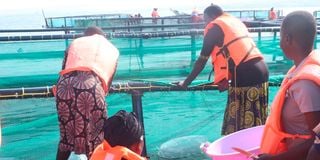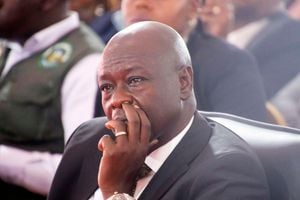Meet the women who said 'no more' to fishing exploitation and 'yes' to empowerment

Women at a fish cage in Lake Victoria near Rasira Beach in Suba South.
What you need to know:
- Women in the lake region are breaking free from exploitation in the fishing industry through a groundbreaking cage fish farming initiative.
- The project has empowered over 300 women to become fish farmers, entrepreneurs, and decision-makers.
- This transformation is not only providing economic independence but also challenging long-standing gender roles in the community.
Along the shores of Lake Victoria, in the heart of Gwassi Ward in Homa Bay County, the rhythmic sound of waves crashing against boats has long been accompanied by the echo of an age-old problem — the practice of jaboya, where fishermen demand sexual favours from women traders in exchange for fish. It is a story that has repeated itself over decades, with men dominating the fishing sector and women relegated to selling the catch in local markets, often at a heavy personal cost.
But today, this narrative is shifting. A wave of transformation is sweeping across the lake region, and women, once at the mercy of fishermen, are rising to claim their rightful place in the blue economy.
One of the trailblazers in this movement is Eunice Auma, a proud mother and wife who, until recently, depended on her husband for support. Eunice has, however, rewritten her story. She is now the chairperson of the Rasira Women Group, as well as the overall chairperson of a coalition of women’s groups that are redefining the fish farming landscape in Rasira Beach.
This transformation has been powered by an initiative called Investing in Women in Blue Economy Project Kenya, backed by Global Affairs Canada, the African Enterprise Challenge Fund, and the women-led Fio Fish Farm.
Under this initiative, more than 300 women from Rasira, Mukuya, Orore and Osoyi in Gwassi, have taken to the waters of Lake Victoria as fish producers, directly involved in cage fish farming — an aquaculture practice that many believe holds the future of sustainable fisheries.
“I can now refer to myself as a qualified fish farmer,” Eunice proudly declares, her eyes alight with confidence. “The knowledge I acquired over the past six months has motivated me to try this venture elsewhere. Using my skill, I expect to personally own cages where I can stock fish and supply the market. It is a major economic activity that can change the lives of people.”

Fish traders weigh fish on Rasira Beach in Suba South.
Cage fish farming, a revolutionary method where fish are kept in cages that float on the lake, fed until they mature, has opened doors for women in Gwassi to become more than mere sellers of fish. It has turned them into farmers, entrepreneurs, and decision-makers. The introduction of the cages last November marked a new beginning for women like Eunice, who now have the tools, resources, and knowledge to actively engage in an industry long monopolised by men.
The project operates through registered women’s groups, each member receiving seed capital, technical support, and a shared cage to begin their fish farming journey. Each cage, home to up to 25,000 fingerlings, is managed collectively by five groups, with each group comprising around 20 members. Their first harvest in June this year was a momentous occasion, and the success of the venture is already inspiring expansion.
Pamela Ososo, another beneficiary, recalls the challenges she used to face in accessing fish to sell. “I would not get fish due to dwindling supply,” she says.

Women carry fish from a boat on Rasira Beach in Suba South.
The traditional fishing method, she explains, has several contemporary challenges, and relying solely on it is no longer sustainable. But with the introduction of cage fish farming, Pamela, like many other women, is now looking to the future with optimism.
“We want each group to own a cage. Every member will get better returns if fewer people manage a cage,” she explains.
This newfound empowerment is deeply rooted in the skills and knowledge that the women have gained through the project. Each member is required to visit the cages on a rotational basis, ensuring they learn every aspect of cage fish farming. From stocking fish to feeding, sampling, and ensuring that the fish mature in the cages, the women are fully involved in the day-to-day operations of the business.
Nivah Ondieki, the farm manager at Fio Fish Farm, oversees the training of the women and is an expert in aquaculture. She emphasises the importance of feeding, explaining that it is the most critical practice to ensure that the fish grow to maturity.
“Fish are fed four or five times a day, depending on their size. We have assigned individuals to every cage to do the work,” she says.
As the fish grow, so does their appetite, and keeping track of their feeding is essential to avoid wastage. Nivah explains that the fish consume 10 per cent of their body weight when they are introduced into the water, which at the farm translates to about 50kg of feed per cage per month. As they grow, this amount increases dramatically. In the sixth month, just before harvest, the fish in one cage can consume up to 1.5 tonnes of feed.
This meticulous attention to detail is what ensures the fish remain healthy and that the farm operates smoothly. Nivah also oversees other critical farm practices, such as cleaning the cages to reduce clogging of the nets and sampling exercises, where up to 2,000 fish are weighed to determine their size before being introduced to new feeds.
“We ensure we keep records of dead fish so that we can tally them during harvest and be able to know the number that survived,” Nivah adds.
The first harvest, conducted in June, was a moment of triumph for the women. Each fish weighed an average of 500gm, with a kilo sold at Sh300. As the women gathered to witness the culmination of months of hard work, pride and satisfaction radiated through the air. This was not just a harvest of fish — it was a harvest of hope, empowerment, and self-reliance.
The women of Gwassi, many of whom had spent years dependent on their husbands, now find themselves contributing to the family income in a significant way. Eunice beams with pride as she talks about the difference this has made in her life.
“I can now pay fees for my children and take care of other family needs,” she says. “Most of us have become empowered and can fend for ourselves. It is a sign that this community will grow economically.”
The ripple effect of this success is already being felt in the community. With each harvest, the women gain more financial independence. Their success has even caught the attention of local leaders, with Kisumu Woman Representative Ruth Odinga and several nominated MCAs attending the first harvest. They hailed the project as a game changer and encouraged more initiatives like it to empower women across the region.
Despite the tremendous strides the women have made, the road to success has not been without its challenges. The cost of fish feed remains a significant hurdle, with feed accounting for up to 65 per cent of the cost of production. Mercy Chepkirui, the Project Manager at Rio Fish Farm, says that while the women’s groups have stocked 75,000 fingerlings, the high cost of feed is a major concern.
“The current cohort has 500,000 fingerlings, but we need to address the cost of feed to ensure that the project remains sustainable,” she says.
To tackle this challenge, the women are being linked to financial institutions where they are acquiring knowledge on managing finances and accessing loans. The goal is for them to form a savings and credit co-operative society (Sacco) and eventually manage their own resources. Already, part of the funds from the first harvest has been deposited into financial institutions with the aim of securing loans for future investments.
“We established that scarcity of fish leads to exploitation of women as they scramble for the limited supply,” says Rio Fish Farm Chief Executive Officer Angela Odero. “By increasing fish production through cage farming, we are not only fighting jaboya but also ensuring that women have a consistent supply of fish to sell and grow their businesses.”
Rio Fish Farm has invested $300,000 in the project and is shifting from metallic cages to plastic ones due to their durability and lower maintenance costs. The goal is to have 60 per cent of the farm’s fish supply come from women, up from the current 10 per cent.
For the women of Gwassi, this project is more than just an economic venture — it is a symbol of hope, independence, and a brighter future.
As Eunice reflects on her journey, she says, “This is just the beginning. We are going to take this opportunity and run with it. Our goal is to be the leading fish suppliers in the region, and I believe we can achieve that.”





